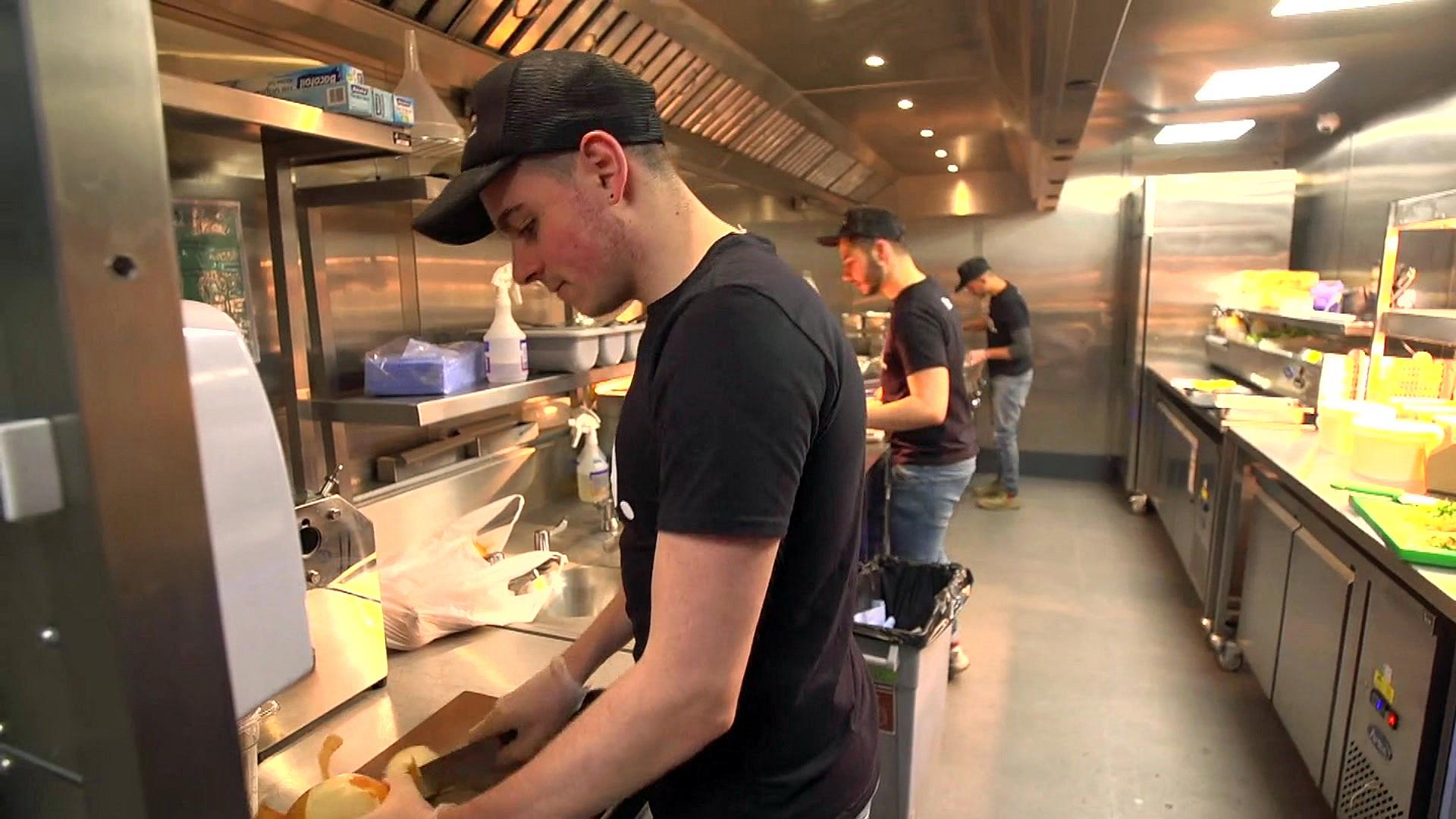Homemade food: The home cooks selling hot dinners on Facebook
- Published
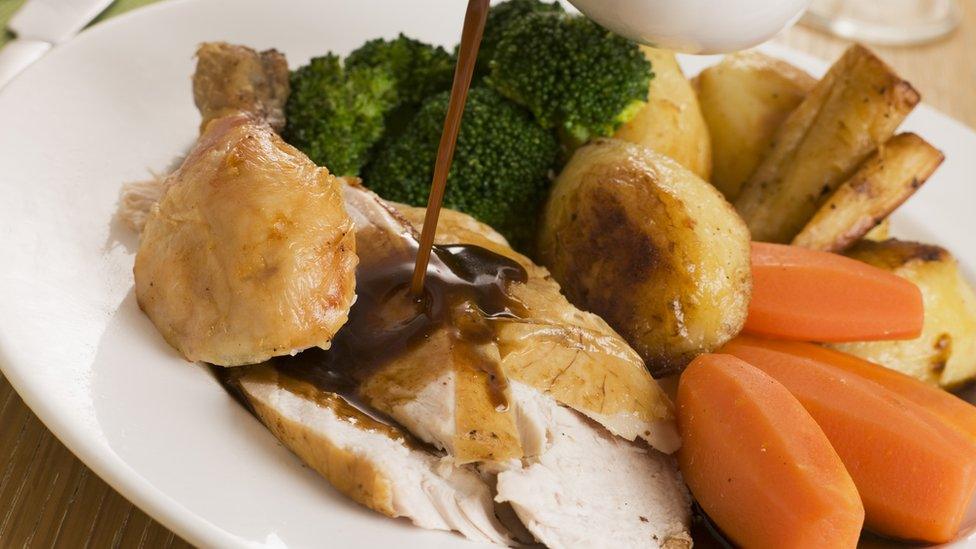
From curries to roasts, cooks are using Facebook to sell hot dinners prepared in home kitchens. The BBC has found thousands of listings for "homemade food" but campaigners want this emerging market regulated and subject to council hygiene inspections.
What are the benefits and downsides of competing with the takeaways from your own home?
'They wanted home-cooked food'
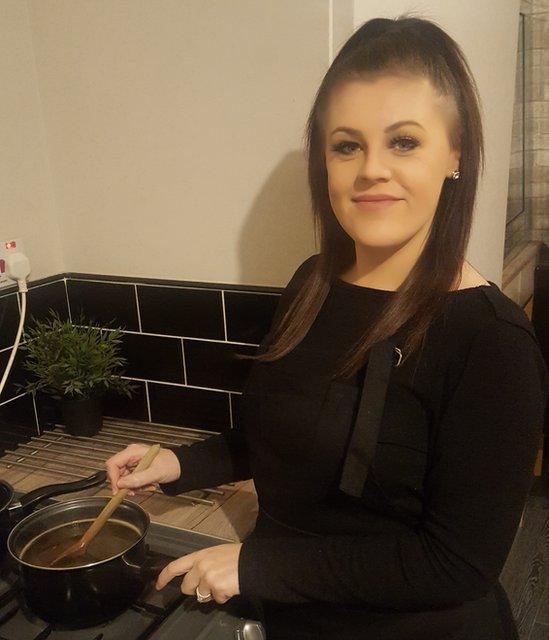
Annise Middleton cooks dozens of roast dinners each weekend
For most parents with young children, the Sunday lie-in is a distant memory. Yet for Annise Middleton from Stoke-on-Trent, her alarm is set for 05:00 anyway.
She gets up to cook about 30 roast dinners, which she will then deliver in her car to customers who have placed their orders via social media, including Facebook Marketplace.
Ms Middleton used to work in community care but now runs her business - which is registered with her local council - from her kitchen at home.
She said: "I'm a mum of four and I struggle with childcare, but hate being out of work, so I thought, what can I do from home?"
The 30-year-old said many of the people she visited in her previous job lived alone and were unable to cook because of age or disability.
"All we had time to do for them was a sandwich and they would have the same boring sandwich for lunch and dinner," she said.
"All they ever would say to me is how much they wanted some home-cooked food."
Ms Middleton drives up to 12 miles from home to deliver Sunday roasts to her customers most weekends.
"I buy my food on a Saturday then I'm up at 05:00 prepping and cooking, then out for delivery between 12:00 and 15:00."
She said it was "pretty straightforward" to register with her local council and believes her meals are "a lot healthier" than those from takeaways.
"At least, with my food, kids will be getting veggies they wouldn't get from a local kebab house," she said.
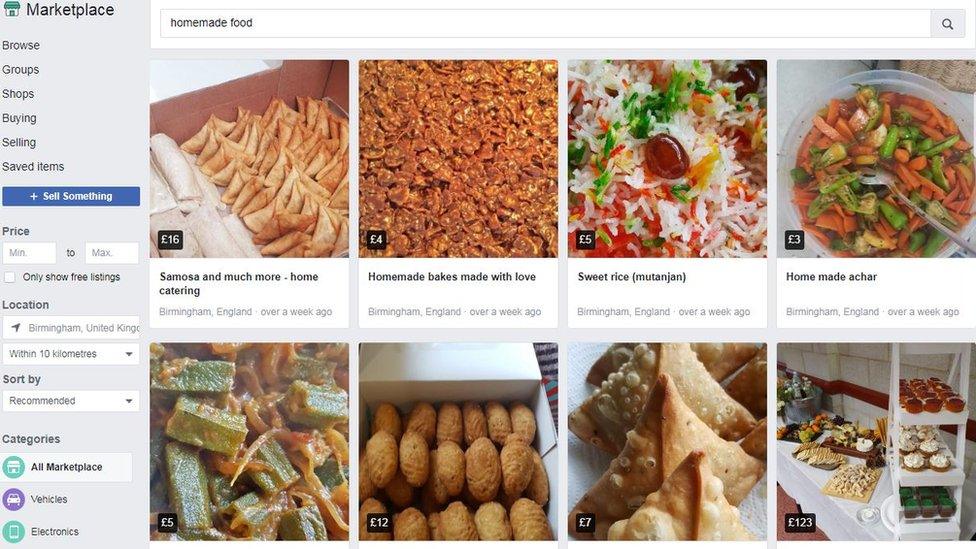
There are thousands of adverts on Facebook for "homemade food"
What types of food are people selling?
Ms Middleton is far from alone in taking food orders on social media.
BBC analysis found more than 3,000 listings across the UK on Facebook Marketplace for "homemade food" on one day.
Indian and Moroccan style food were the most common nationalities available to buy with words like "fresh", "chicken", "samosas", "cake" and "curry" appearing most.
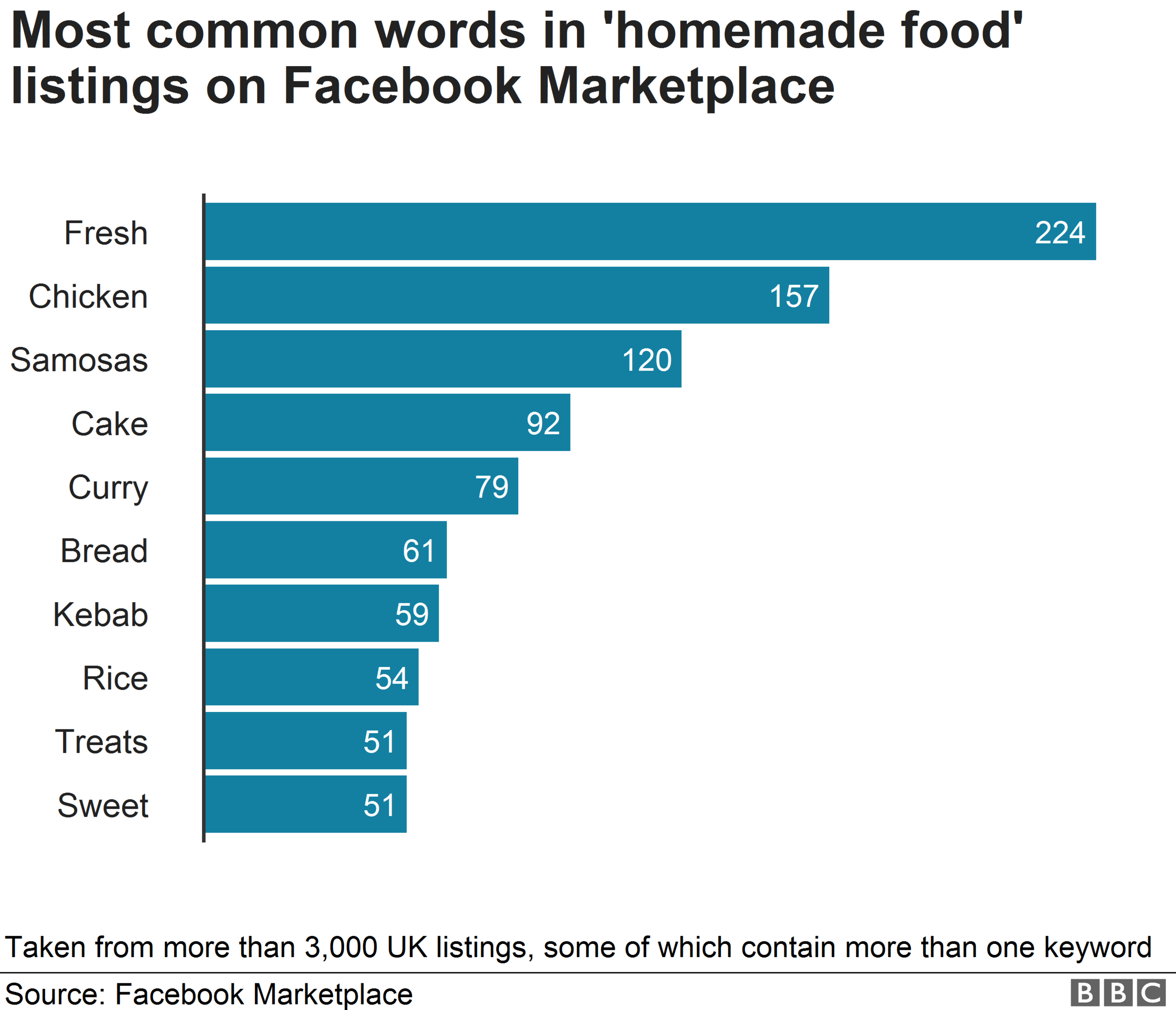
Analysis by the BBC found 20 adverts on one day for either "curry" or "biryani" coming from Luton with another 14 from Blackburn and 13 from Birmingham.
There were also 25 adverts referring to meat, chicken, beef, lamb or fish under "homemade food" in London, 24 in Birmingham and 23 in Manchester.
Kebabs were most common in Lancashire, with 15 postings emanating from or near to Nelson and another three near Blackburn.
There were 10 adverts involving bread or cakes from Sheffield, along with five from Glasgow, while 10 from Slough referred to "meat, beef or lamb".

You may also like:

'It isn't easy'

Nasrin Rehmanwala gets about six orders a week

Nasrin Rehmanwala from Cheltenham said most of her food business began through "word of mouth" among her friends, before she branched out to social media.
She registered with her local council to sell homemade Indian food after saying she saw a lack of "authentic" restaurants in the country, and typically gets about six orders a week.
Focussing on a few dishes each week, she takes orders from Friday to Monday, with customers collecting the meals from her home.
"It isn't easy to sell on social media or any other platforms because [consumers] don't know the quality of food people will sell," she said.
"The only real bad experience I had online is one 'non-client' leaving a fake bad review. That was disappointing as my real customers have all left great reviews."
Mrs Rehmanwala, 36, who also has a food hygiene certificate, said it was a very good idea for councils and the Food Standards Agency (FSA) to regulate online food sales.
"It's really important that food is prepared properly, hygienically and in a clean environment and to enable customers to trust the business," she said.
'They can see what I'm doing'

Johelis Zambrano cooks for people in their own kitchens
Johelis Zambrano from Birmingham prefers to be hired by clients to cook homemade food in their kitchens, rather than her own.
The mother of two, originally from Venezuela, said: "Then they can see what I'm doing and they can see what ingredients I'm using."
Ms Zambrano, who has run restaurants in the past, said she liked this way of working because it was "flexible".
"I can do it any time I want, it's less pressure," she said.
She said because of the prevalence of allergies, it was important for homemade food sellers to be "registered and insured".
What are the rules on selling home-cooked food?
Campaign group Unchecked has called for home cooks who sell meals to be subject to the same inspections as takeaways and be given hygiene ratings.
It said unregistered food producers selling on social media posed a risk to health because of a lack of checks on hygiene standards.
"There is no requirement for sellers to register with their local authority, meaning that online food producers are operating completely under the radar," Emma Rose, from the group, said.
"Food containing undeclared allergens, unspecified meat, or dangerous food-related bugs could be being consumed by unwitting customers - and there is no way of tracking the extent to which this is happening."
The FSA said running a food business does not require a qualification, but the person must demonstrate "safe food handling and supply".
"People operating food businesses must register those businesses with the local authority, ideally 28 days before the commencement of trade," a spokeswoman said.
However, small scale operations can take place without registration as long as supply is "occasional", the agency has said, and there is no "clear cut" definition of when a supplier should register.
The FSA said local authorities can take a range of actions against those who did not comply with food laws, from informal steps such as written warnings, to formal actions such as forcing sellers to close down and prosecution.
A Facebook spokesman said: "Our commerce policies set out what can and cannot be sold on Facebook.
"These make clear that sellers are responsible for complying with all applicable laws and regulations."
- Published8 May 2019
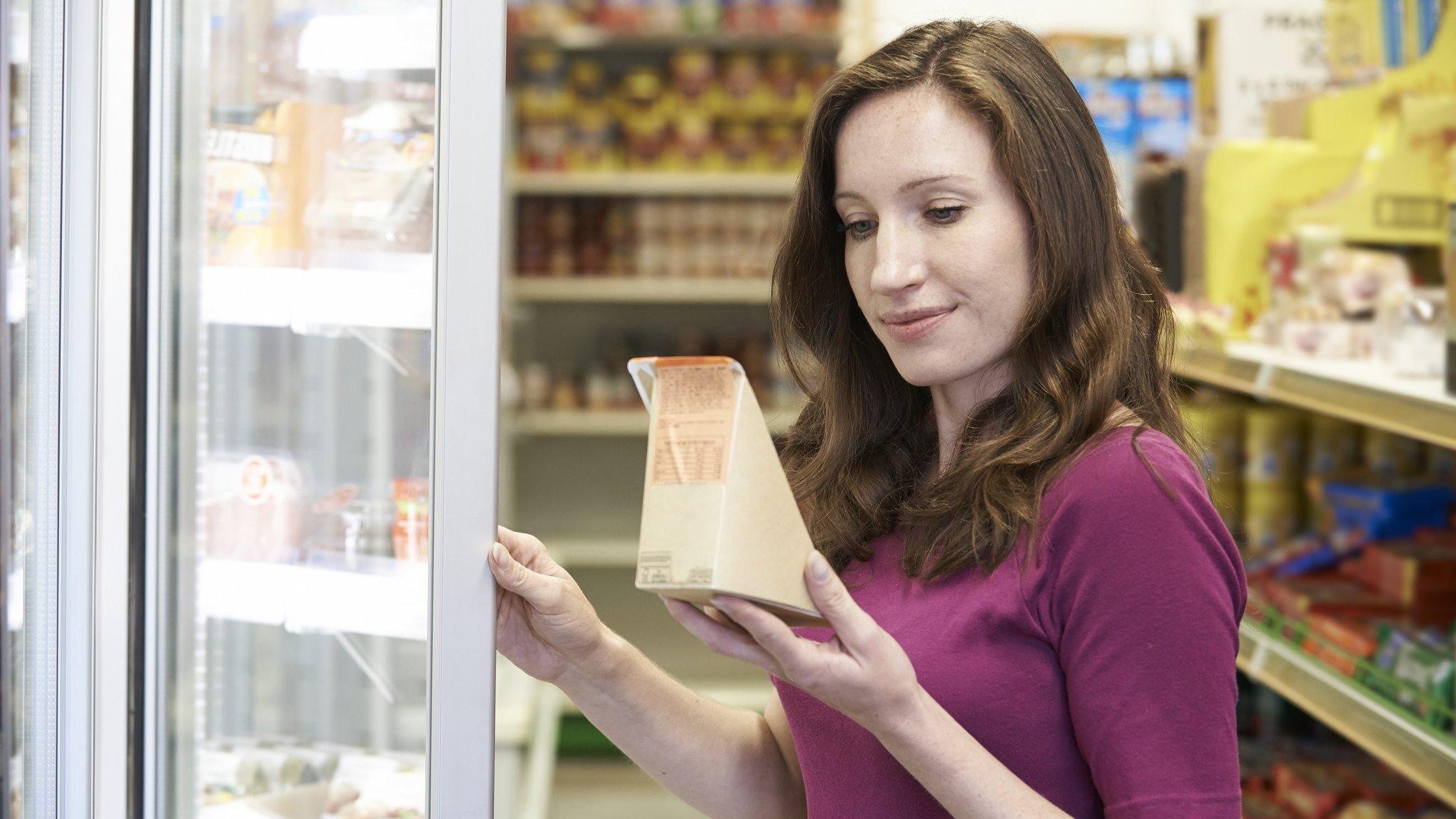
- Published23 April 2019
